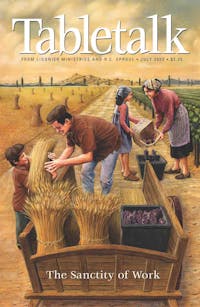
Request your free, three-month trial to Tabletalk magazine. You’ll receive the print issue monthly and gain immediate digital access to decades of archives. This trial is risk-free. No credit card required.
Try Tabletalk NowAlready receive Tabletalk magazine every month?
Verify your email address to gain unlimited access.
When I was asked to write this review, my initial response was less than enthusiastic. Personally, the subject of economics fails to excite me. It ranks low on my list for interesting reading. Thus, even though I recognize the fact that the Bible deals strongly with economics, it was with a somewhat listless posture that I approached Dr. R.C. Sproul Jr.’s book Biblical Economics, published by Draught Horse Press.
However, what I discovered within its pages helped me to overcome my aversion to this topic. I was swayed from my disposition of abhorrence to mild curiosity, and sometimes even further on—depending on the chapter—to serious interest.
The topic itself is difficult, yet it is one by which people generally are enamored, partly because of the vast and varied implications of economics in their lives. But one of the reasons this book is needed is that, even though people are concerned and generally aware of the importance of the subject matter, most have either a very limited or distorted understanding of what economics is. If you’re one who really doesn’t think it’s necessary to study economics, then you may want to re-consider your position in light of a statement on page 15 of the introduction, where Sproul writes that Christians have a responsibility to reflect the glory of God into every realm, including sociology, political science, and, yes, even economics.
The topics covered in this book include stewardship, creation, prosperity, profit, money, inflation, debt, poverty, equity, and the government. These are all important issues, and Sproul does the reader a service by taking these technical issues and untangling them, offering a strong introduction to each. The book is well written and easy to understand, eloquent and clear, yet the substance is also compelling, particularly when Sproul strives to underscore a point. He often illuminates the positives and negatives of various good and bad economic policies through Biblical evidence and historical illustrations, which in turn reveal how various economic theories have caused profound consequences to ripple far and wide in the nation and world.
In this volume, Sproul deals not only with the philosophical side of economics, but with the ethical and moral areas, as well. His social concern and compassion for the hurting are evident throughout this volume. In an effort to remedy various social ills in the world, he takes particular aim at socialism. He also labors to underscore what is wrong currently with the United States’ economic system, which he would assert is becoming more and more socialistic.
Perhaps the predominant feature in this work, and certainly its most important aspect, is Sproul’s passion to follow Christ. One example can be seen on page 119, where he brings a balance to the whole discussion by reminding us that the main purpose of the Christian life is to draw closer to Christ, to abide in Him, and be content with Him alone, for He is our source of life. “If we would be free, we need to learn to be satisfied with this—that the Lord is our shepherd. If that is the case, we shall not, indeed cannot want. For He is our all in all. As is so often the case, Jesus turns the wisdom of this world upside down. If we would be free, we must become slaves to Him, making our lives a living sacrifice, rather than just another image of the pursuit of personal peace and affluence.”
